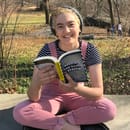Ever since I started university I have been reading more YA fiction than I ever had when I was a teengaer; I began to wonder why it was that I loved these books now, far more than I had when I was the age of the protagonists. Why was it that these stories that take place in the halls of high school, in small towns, and childhood bedrooms appealed to me? Was it nostalgia and escapism? Some kind of attempt to relive, or rewrite my own high school experiences? Or was it because I still felt like a teenager myself, still trying to negotiate my own identity and place in the world?

When I was in high school, I spent a lot more time browsing bookstores, than I did actually reading books. I’d search endlessly for the right book and spend all my allowance on books I never ended up reading. Outside of school, the only books that I actually finished were YA books; they were few and far between, but their effect on me felt so profound that I still identified myself as a reader, and I kept searching for books that might provide a similar experience. They were a break from the monotony of the overly analyzed pieces of literature we had to read in school (the classics that have been read so many times that all interpretation for meaning is so nailed down that it becomes an act of memorization, rather than an exercise in critical thinking). YA books were an escape, as opposed to the effort of reading “intellectual” books (though, I would argue that YA books are plenty intellectual, but that’s another discussion). They serve as an escape, in the sense that they are extremely accessible to read; they appeal to a contemporary audience and they are not weighed down by heavy literary jargon. But I think the most significant appeal is the identification with the young protagonists and their individual struggles – finding a person, even if they are fictional, that speak to your own individual experiences.
But in my later high school years when I was in the midst of discovering my queer identity, I couldn’t find any books that described my experience, or any characters that I could actively identify with. And if those books did exist, they certainly were not displayed in my local (conservative) suburb. It wasn’t until I was well into my first year of university that I began to discover the plethora of queer YA books that were beginning to pop up; and so began my voracious consumption of every queer YA book that I could get my hands on. First there was Aristotle and Dante Discover the Secrets of the Universe, then I’ll Give You the Sun, and Simon vs. the Homo Sapiens Agenda. I discovered that queer YA, though certaintly in a golden era of publishing at the moment, had existed since books like Annie on My Mind – a lesbian romance written in the 1980s. I became more and more invested in the world of queer YA fiction and the authors who write them, preordering new releases (Felix Ever After and Darius the Great Deserves Better!) as soon as they were announced and following the ongoing sequel announcements of authors on Twitter. I am sometimes unsure of whether it is the characters I identify with more or the authors who are working to create spaces for queer stories to be told. As a young adult only a couple years removed from teenagerdom, I find that I can look at YA fiction through two lenses: first, through character identification because I still relate to the teenage anxieties of first loves and endless identity questioning, and second, at the more objective level of formulaic and linguistic choices that are often brushed off as simplistic (but maybe that is just the English Lit student in me talking). When we examine YA literature from both these stances, it becomes clear that YA is an incredibly diverse and innovative space for literature. In just the few years between when I was in high school and now, YA literature has exploded with new and diverse stories; in many ways, I think YA is unique from other bodies of literature in its encouragement of contemporary topics, which are more and more often from authors of marginalized identities. Because of this, I think YA fiction is an extremely interesting body of literature to examine, and valuable to readers of all ages; YA is constantly combatting topics that no other genre wants to talk about, because it has to remain relevant to young readers.
And yet, I think the reason I read YA is more complex than just queer identification, or its relevancy, or its diversity. The thing that brings me back again and again is this universality of self-discovery and change. YA fiction is dependent on ideas of identity and transformation, and so it is relatable to readers of all ages. We don’t grow out of change, so perhaps we don’t grow out of YA either. The project of self-discovery and transformation does not end after we graduate high school, and so the coming-of-age stories of YA continue to speak to us, however old we get.



